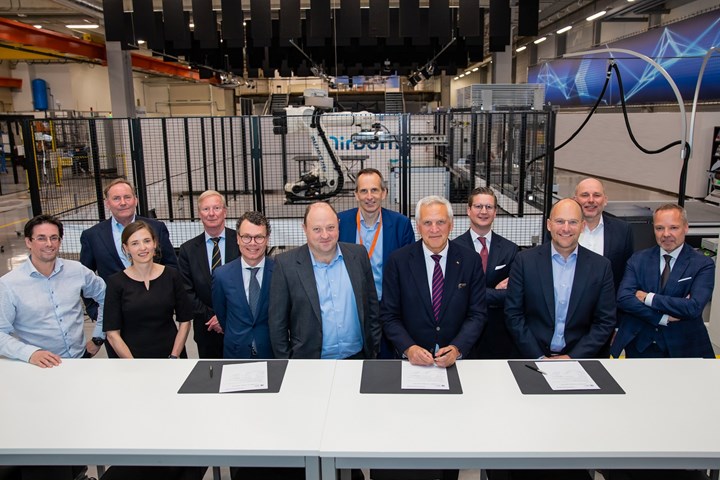Airborne automated, digital manufacturing projects backed by €16 million in EIB financing
Airborne is involved in several projects with global partners to develop and commercialize new composites automation opportunities in electric mobility, New Space, aerospace and hydrogen markets.

Photo Credit: Airborne
The European Investment Bank (EIB) has confirmed €16 million in new financing to support research and development (R&D) investment by Airborne International (The Hague, Netherlands). The financing will be used to further develop automated and digital manufacturing of composites and the development of advanced products for New Space and big science applications.
“EIB backing for Airborne’s investment program enables us to accelerate development and commercialization of new composite automation, enabling lower costs, much more flexibility and reduced material waste,” Arno van Mourik, CEO of Airborne, says. “This will allow our customers to develop and manufacture advanced composite products to be more sustainable, reduce fuel consumption and provide higher performance.”
The company says it is currently working on a range of projects with global partners to boost sustainable innovation, several of which seek to develop novel, lightweight structures for future electric mobility. For instance, in aerospace, alongside a Dutch consortium involving GKN Aerospace (Redditch, U.K.), Toray Advanced Composites (Nijverdal, Netherlands), Collins Aerospace (Chula Vista, Calif., U.S.) and others, new concepts for thermoplastic composite structures are being developed for the emerging advanced air mobility market (AAM), with Airborne focusing on digital and automated technologies to manufacture tailored blank laminates. A partnership with Venturi Aviation (Delft, Netherlands) serves to manufacture lightweight composite structures for the Echelon 01, a battery-electric regional airliner with a 44-seat capacity and 500-kilometer range, to be manufactured in volume production from 2029 onward. Furthermore, Airborne is working on several projects around lightweight composite battery systems, both for aerospace and automotive. The first projects are planned to go into production in 2022.
Still, other projects center around technologies for future hydrogen storage tanks for long-range airplanes with Toray Advanced Composites and technologies for mobility electrification (passenger cars, trucks, buses) with VDL Nedcar (Born, Netherlands). Airborne says one of the results will be a flexible battery assembly line; the company expects to use its “Automated Programming” technology to create an adaptable manufacturing line that can adjust on-the-fly.
Related Content
-
ASCEND program update: Designing next-gen, high-rate auto and aerospace composites
GKN Aerospace, McLaren Automotive and U.K.-based partners share goals and progress aiming at high-rate, Industry 4.0-enabled, sustainable materials and processes.
-
McClarin Composites partners with ExxonMobil to accelerate high-speed RTM
Multimillion-dollar investment to drive next-gen automated RTM technology will open new applications and markets for composites OEMs.
-
Airbus selects Airborne to supply automated ply placement system
The pick-and-place system with software-driven automated will be the first in Airbus facilities, enabling highly efficient and flexible dry fiber preform manufacture for A350 structures.







.jpg;maxWidth=300;quality=90)




